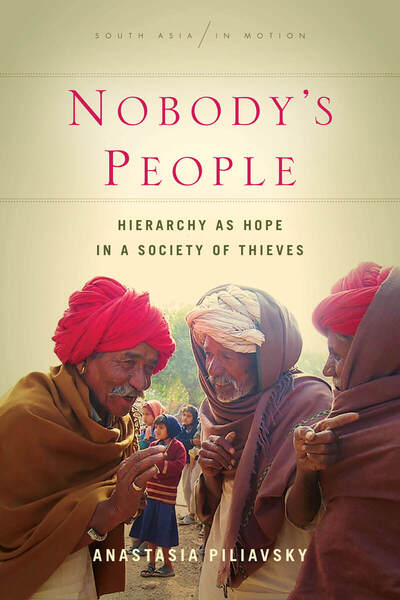
2020
300 pages.
from $35.00
Paperback now $17.50 (50% off)
Hardcover ISBN: 9781503604643
Paperback ISBN: 9781503614208
Ebook ISBN: 9781503614215
What if we could imagine hierarchy not as a social ill, but as a source of social hope? Taking us into a "caste of thieves" in northern India, Nobody's People depicts hierarchy as a normative idiom through which people imagine better lives and pursue social ambitions. Failing to find a place inside hierarchic relations, the book's heroes are "nobody's people": perceived as worthless, disposable and so open to being murdered with no regret or remorse. Following their journey between death and hope, we learn to perceive vertical, non-equal relations as a social good, not only in rural Rajasthan, but also in much of the world—including settings stridently committed to equality. Challenging egalo-normative commitments, Anastasia Piliavsky asks scholars across the disciplines to recognize hierarchy as a major intellectual resource.
About the author
Anastasia Piliavsky is Senior Lecturer in Anthropology and Politics at the India Institute at King's College London. She is the editor of Patronage as Politics in South Asia (2014).
"It's difficult to overemphasize the effect of this narrative: the brio with which it is written, the verve of its characters, the author's intellectual panache. This scintillating re-reading of hierarchy, most poignant where it has supposedly been banished, picks apart one of anthropology's greatest conundrums and poses profound questions for evaluations based on social equivalence."
—Marilyn Strathern, University of Cambridge
"Moving away from the ideas of ineffability and stasis that attach to understandings of caste, Piliavsky puts forward a courageous, refreshingly original position on hierarchy."
—Dilip Menon, University of Witwatersrand
"An extraordinary work. A major rethinking of the social productivity of hierarchical relations, this is ethnographically grounded anthropological theorizing at its best. It should fundamentally transform contemporary conversations about the nature of social life."
—Joel Robbins, University of Cambridge
"By exploring the politics of everyday patronage, this compelling study of a 'caste of thieves' addresses one of the most important debates in the sociology of South Asia."
—Filippo Osella, Professor of Anthropology and South Asian Studies, Sussex University